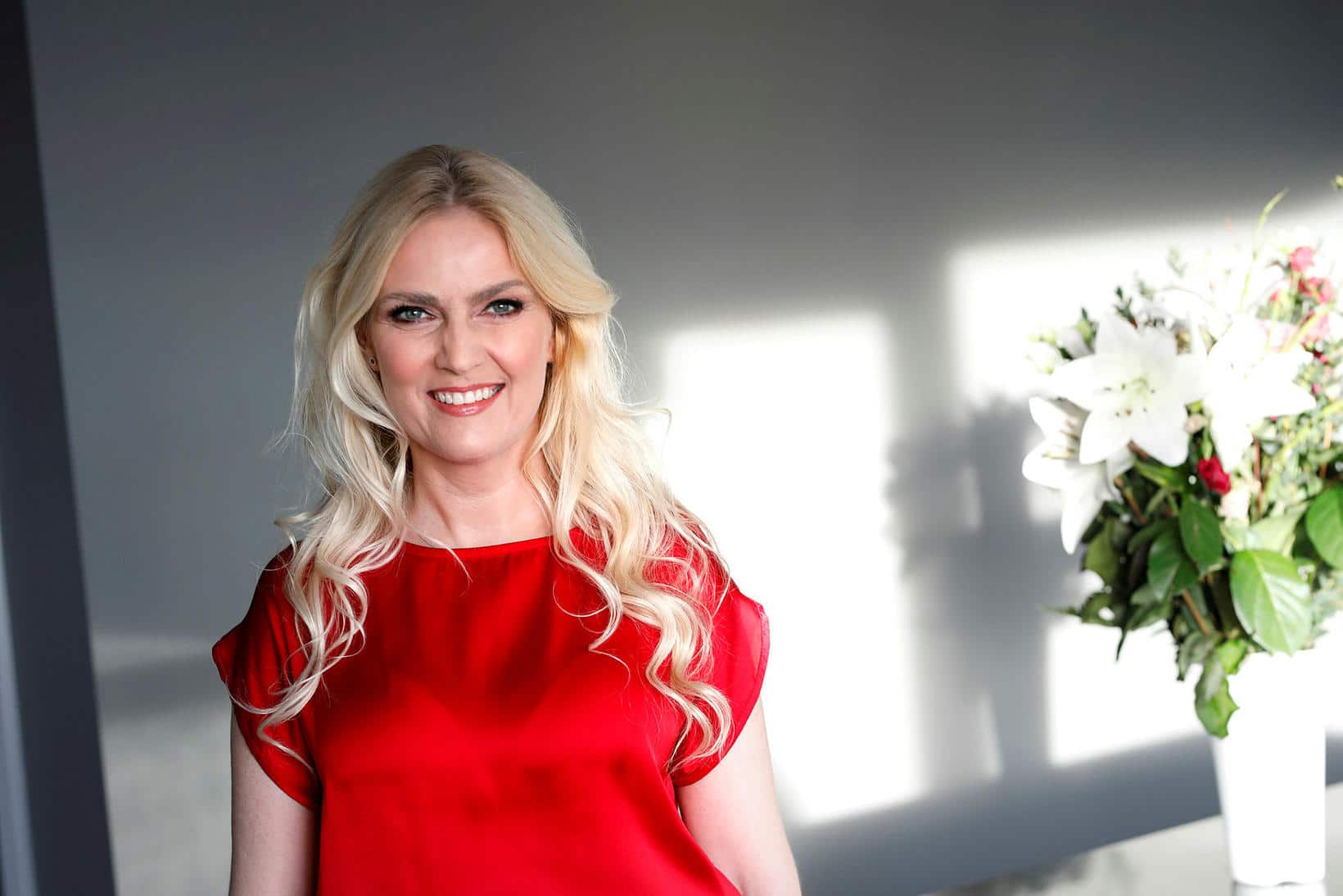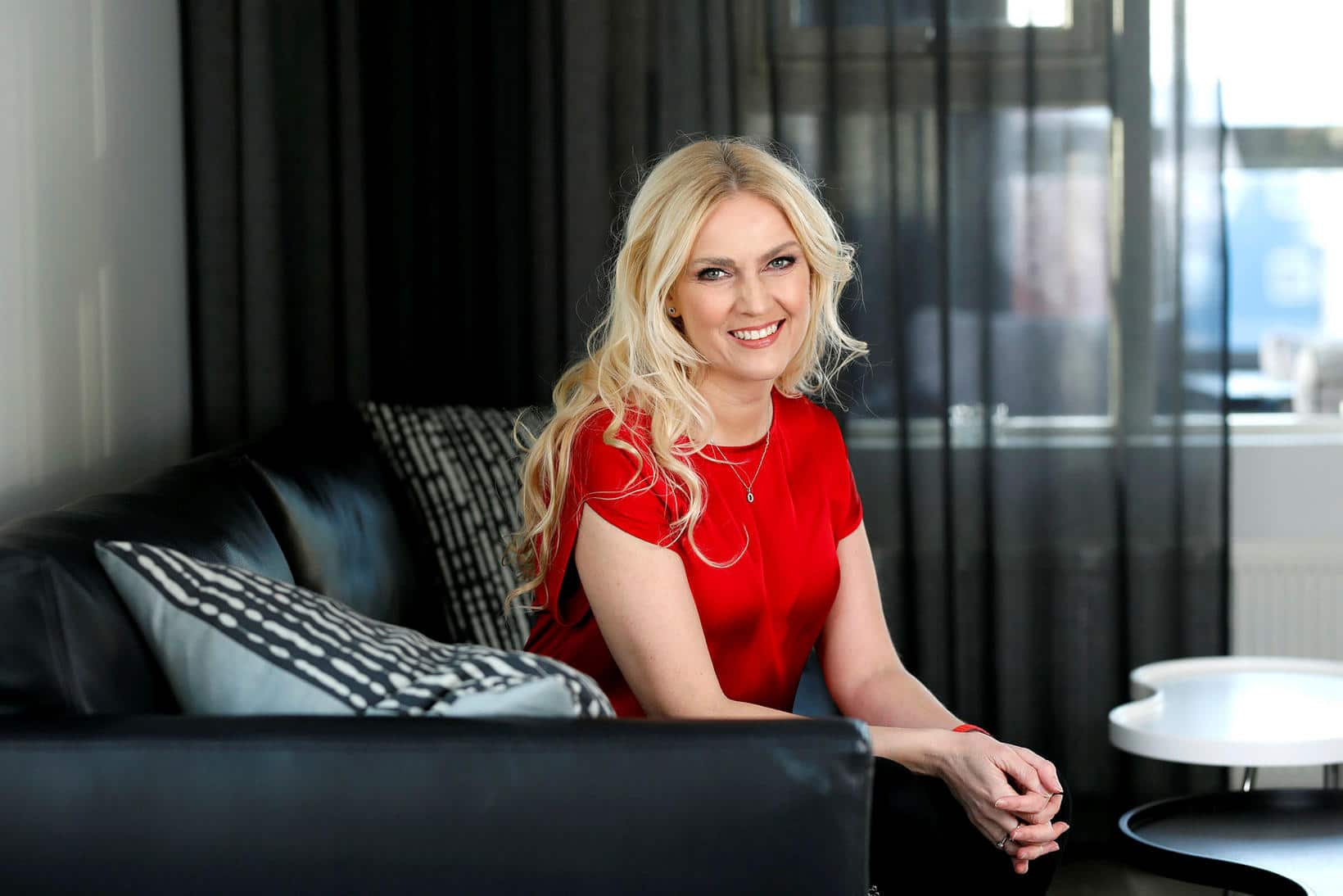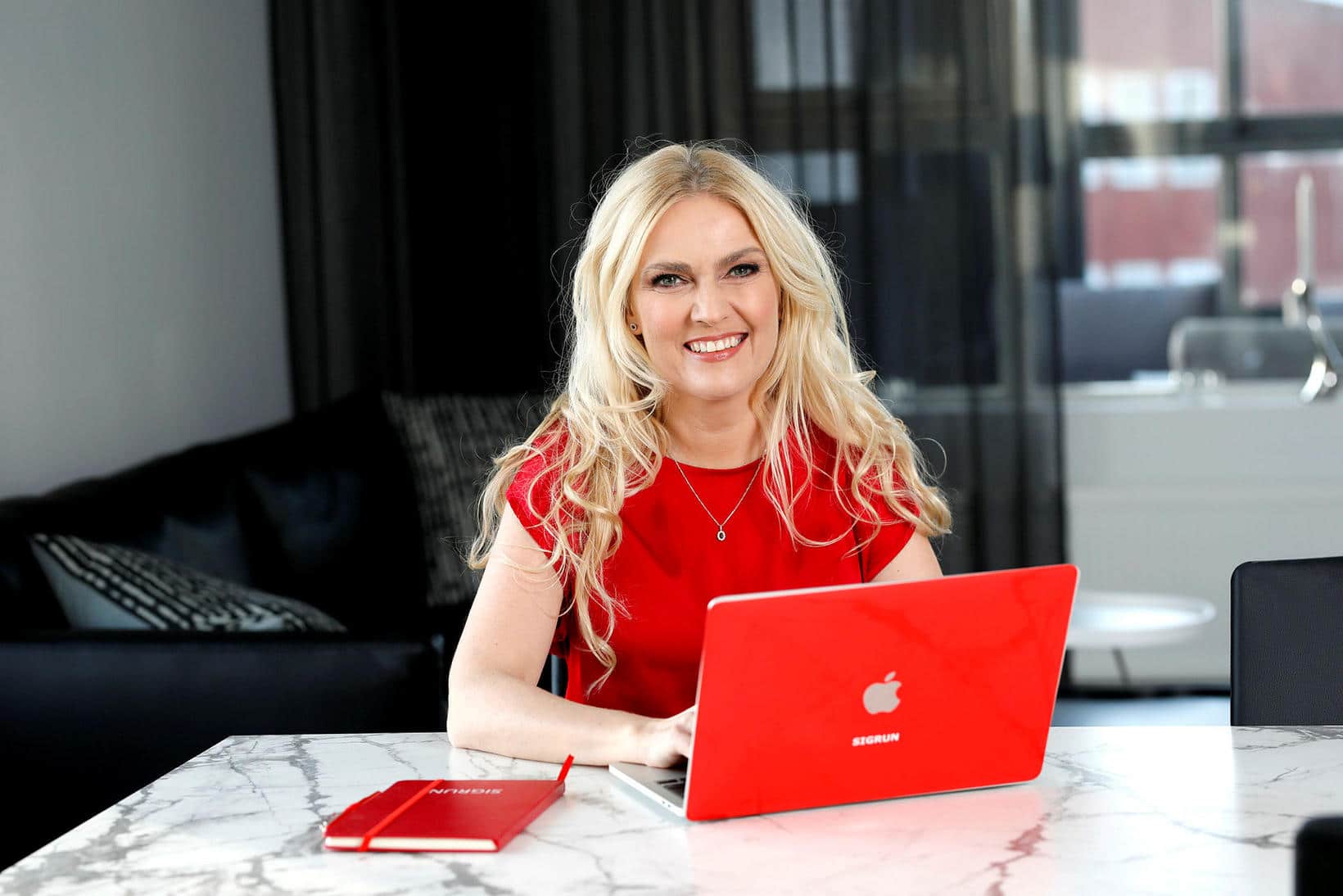
Photo by Eggert Jóhannesson
Original interview published by Morgunbladid in Iceland
In the last seven years, Sigrun Guðjónsdóttir has made over a billion ISK ($8M+) in revenue helping women all over the world to build service-based online businesses. She is an international business coach based in Switzerland and Iceland. She’s a TEDx speaker, the host of The Sigrun Show podcast, has a weekly show on YouTube and appears regularly on international podcasts and conferences.
Sigrun holds a master’s degree in architecture from Karlsruhe University of Technology and master’s degree in computer aided architectural design from ETH in Zurich. After her graduation she moved to Iceland where she started working as an information architect and later as a department manager at a software company, specialising in the commercial use of spatial information. Sigrun went on to study computer science at the University of Iceland and soon became the CEO at two IT companies in Iceland, first of a small website company, where in a short time, she turned it into a profitable company after seven years being in the red. At 33, she also became the CEO of the 4th largest IT company in Iceland until the company was sold 15 months later. She was then responsible for further development of the web company until it was merged with another similar-sized web company.
After leaving her last position, Sigrun went to London to complete an Executive MBA at the London School of Business. She graduated in 2008 and moved to Switzerland where she became the managing director of a Swiss medical technology company. Due to chronic pain, she was forced to quit her job and was unable to work for seven months. Once she was able to return to work, she took over as country manager of an Icelandic software company in Switzerland. A year later, she suggested they hire a managing director in Germany to save costs, and left the company.
Helping women achieve their dreams
In 2014, Sigrun founded a company in Switzerland with the aim of helping women build online businesses. In just seven years, Sigrun built up an international coaching company, maintaining an annual growth of 30%. Sigrun has helped over 3,500 women of all ages, from all over the world to build online businesses from scratch and reach hundreds of millions of ISK (over $1M) in revenue. Her mission is to accelerate gender equality through female entrepreneurship.
“Women in other countries haven’t had the same upbringing as women in Iceland and didn’t experience equality the same way I did. By working with women around the world, I have a greater impact. Every woman who joins one of my programs learns how to create an online business, but also how to put herself first, follow her dreams and believe in herself. My goal is to help women believe that they can do anything.”
Sigrun enjoys talking about money and says there should be no shame in it.
“Women should think more about how to generate revenue. Influencing and changing the world costs money, and women are better at investing money into good causes. I have made over $9M in the last seven years and I expect to make at least $5M in revenue this year. I’m not earning money to sit on a pile of cash but to influence and change the world and make my dreams come true.”
Sigrun lives with her husband Martin Uetz just outside Zurich, Switzerland and appreciates having her own business and being able to freely decide what she does on a daily basis.
“It’s so important to find your purpose and understand how you can design your life by living that purpose. In Oprah’s words, You’ve got to follow your passion. You’ve got to figure out what you love, who you really are and have the courage to do that. I believe the only courage anybody ever needs is the courage to follow your own dreams.“

Photo by Eggert Jóhannesson
Women Have to Think Bigger
The mission guiding Sigrun is to accelerate gender equality.
“Women have to think bigger. Too many women settle for low incomes and small businesses. More and more women are starting businesses today but these businesses are often too small to make a decent income for these women and no assets are created. Many women think that bigger companies are more work, but the opposite is true. As my business grows, I can hire people to do many things for me. With a bigger company, I can afford to do things that I only used to dream about. For example, last year I paid down a $100K mortgage on an apartment I bought 19 years ago. I also paid off a $100K student loan and bought a new apartment. At the same time, I give back and help women who are struggling in the current economic circumstances caused by the Corona crisis. It’s possible to grow your business and help others along the way, but only when we think bigger.”
Sigrun says the most important thing is to learn how to sell. As a rule, she gets her clients to buy her programs or courses before she creates them.
In January, she sold her SOMBA (Sigrun’s Online MBA) Kickstart program to over 400 clients, generating $1.2M in revenue, and now, she’s already planning her next marketing campaign.
She wants to empower other women to make their dreams come true through their businesses, while setting out to achieve gender equality.
The first time Sigrun made a lot of money, she felt guilty. Today, she firmly believes she deserves to earn what she does, since changing the world comes at a cost.
Raised to Believe in Herself
Sigrun is happily married and always wears red. But her life hasn’t always been like this.
“I was raised to believe in myself and never had the feeling that I couldn’t do something. I have always been eager to learn. I remember that in kindergarten, I picked up the Nordic accent of my preschool teacher, just because I really liked her. I loved telling stories and wanted to be a writer. When I was six years old, a story I wrote was picked to be read on national radio. But when I heard that very few writers make a living from writing, I changed my mind about becoming a writer. I decided to become a teacher instead, until the teachers’ strike broke out and I discovered that teachers had very low salaries.”
Sigrun also loved to draw, and she started to design beautiful houses for her classmates.

Photo by Eggert Jóhannesson
The Course that Changed Her Life
Why does Sigrun choose to think so big?
“When I was attending high school, I used to wear clothes I made myself. I wanted to get better at it and enrolled in a sewing course that would end up changing my life. At sixteen, I was the youngest participant. All the other women were over forty. The course lasted eight weeks and during our lessons, the women talked about their lives and dreams. They all had in common that they had sacrificed their own dreams for the dreams of their husbands and children. This made me very angry – not at the women, but at our society. Why should the dreams of men be more important than the dreams of women? That’s when I decided not to have children of my own. I was so angry I wouldn’t even allow men to hold doors open for me anymore.”
From the time Sigrun took that sewing course, she has wanted to be a driving force for other women in their lives. It took her some time to figure out how she was going to do that, but since she started her business, she has led many women to become and grow as entrepreneurs.
Sigrun says it took some trial and error to find her own path. Even when people have decades of experience and are well educated, it can be difficult to access the talents within them and attract the right clients for what they can offer. While it’s necessary to know how to make business plans and understand marketing, Sigrun says the most important factor in creating a business is to identify your ideal client.

Photo by Eggert Jóhannesson
She Attracts Her Clients, Not the Other Way Around
“I attract my clients online. If they like me and trust me, they’ll work with me, and otherwise they will find someone else to work with who suits them better. I have released over four hundred podcast episodes and hundreds of webinars. I share my own experience of what works instead of referring to examples others are recommending.”
Sigrun has long-standing experience as a manager and CEO. She originally studied architecture in Germany, and then worked in the computer science department of the University of Karlsruhe before being invited to Switzerland to study computer-related architecture. That was where she first became passionate about information technology.
In 2000, Sigrun decided that she wanted to return to Iceland and got a job at a company that produced maps for travel sites and mobile phones. She lost that job in 2002 and then took a three-month evening course where she learned how to create her first business plan.
At that time, Sigrun’s sister was working for a web company and with her business plan, Sigrun was hired as a web consultant.
“I ended up becoming the main project manager. After a year on the job, the company was suddenly sold. I knew little about the state of the company, but my sister and I had been in charge of all sales for some time.
I got the crazy idea that I could become the next CEO and after talking to a few people, I decided to explore this idea. I contacted a woman who was working for the new owners and had been my neighbor as a child and asked her what I needed to do to be considered as the CEO. I prepared a two-page memo on the situation the company was in and its vision for the future, met the new owner at a café and got the job even though I had no business education or business experience.”
Learning by Doing
When Sigrun became CEO of the web company, she found out that the company owed a lot of money in pension funds and had a lot of other debt.
“I was not hired for my skills in business and accounting, but for my interest in the job and willingness to turn the company around. I decided to study the books and took the accounting binders home with me and spent evenings flipping through bills. I identified units within the company that could be sold and found vouchers we didn’t need that I used to pay off the debts. I’ve always liked finding hidden treasures. It took me just eleven months to turn the company around.”
At that time, Sigrun was also a Dale Carnegie trainer, and during one of the evening meetings, Sigrun received a call asking if she would be interested in taking over as CEO of another IT company.
“It was the fourth largest IT company in the country, with 73 employees and considerable operating losses. I agreed and don’t regret it, but I didn’t have enough support or experience to be able to complete the task in the way I wanted. The owners had given up on the company and things didn’t go as I would have liked them to. “
How did this affect you?
“I did the best I could, so I don’t regret anything. I gained a lot of experience in purchase management, warehousing and contracting. I have rarely learned so much in my life. At 33 years old I wasn’t very experienced, but I had a good insight into business. For example, I felt that we had far too much in stock, so I went and downloaded our competitors’ annual accounts. When I looked at their KPIs, I saw that we were not doing well in this area. So I read up on inventory management and learned about the ABC rule which says that inventory should be differentiated by product category. Some products are in category A and always need to be in stock. Other products that sell more slowly are in category B, which means we order them less frequently. And the products in category C are ordered only on demand. I don’t give up easily. It was never an option for me to resign and leave. The management was difficult and as a result, the company got sold to competitors and my boss asked me to focus on the small web software company again. It was difficult to return back to running a smaller company with all the experience I had gained, but I decided to use the opportunity to do an MBA. I searched online for the best MBA program in Europe, which was then taught at the London Business School, and I enrolled into the Executive MBA program.”
Sigrun’s professional journey wasn’t always easy.
“I’ve been fired, despite performing well. In my case, management didn’t share my opinions or values and therefore a collaboration didn’t work.”
How did you feel about being fired?
“I feel fine about being fired. It has happened several times and was not difficult, in hindsight. I have my values and they don’t fit everywhere. I was unemployed with a six-month termination contract when I moved to London and was then able to concentrate on my final thesis in my MBA studies. I took the opportunity to attend a Tony Robbins seminar in February 2008 that had a profound effect on me. That’s where I met my husband. It would never have happened if I hadn’t lost my job.”
What about love?
“I met my husband, Martin Uetz, in London. I had been single for five years and sat down next to him and his mother at Tony Robbins’ seminar and we immediately got along. I signed up for more seminars with Tony Robbins and he did, too, so we met often before we decided to date. Tony Robbins talked about a human being’s six main needs and love was one of them. I had not invested in love the way I wanted to. So when I graduated with my MBA and was offered a CEO position at Nissan in Sweden, I declined and instead moved to Switzerland to start a life with Martin. I didn’t want to keep going through life without giving love a chance. My husband had a good job at Cisco Systems and supported me during my first six months in Switzerland. At first I found this difficult, but I was determined to do my best in this new environment. I finally found a job but the working conditions weren’t great so I became ill after only a year. My body was saying no. I couldn’t work for seven months and was in a lot of pain. While I was sick, I made the most of my time by doing all kinds of online courses and learning new things.”
The Existential Crisis that Changed Her Life
Sigrun says she has more or less recovered, but that she now understands people who experience difficulties as a result of getting sick at work.
“I had never been bullied at school but I was bullied at work because of my illness. It resulted in me having an existential crisis and thinking about what I wanted to do with the rest of my life. I knew I was good at many things but I couldn’t figure out what my special strengths were and kept looking for ideas elsewhere.”
Her crisis lasted eighteen months. At the end of 2013 she started setting up her website but was unsatisfied with the way it looked. She kept changing the theme, trying to make the website better but didn’t include any information on how to work with her.
“Then I learned that sometimes, you have to start before you feel ready. In January 2014, I was still throwing spaghetti at the wall – I was trying all sorts of things to see what would work. Not everything was in vain: I was helping women in different Facebook groups with my business knowledge. It’s without doubt the reason why initially I was very successful in building my email list. People knew me when I started offering business coaching. I finally added a button on my website and offered an hour of coaching for $180.”
Today, Sigrun doesn’t offer one-on-one consulting anymore. The last time she charged for one hour of consulting, it was $2,500.
How were you able to raise your rates?
“The increasing demand made me raise my fee. My current hourly rate shows that I’m no longer interested in offering individual coaching. When I first started, I found it very difficult to decide on the price because I didn’t know how valuable my knowledge was to other people. There was a woman who bought a coaching session from me early on, and she told me that she had bought coaching sessions from several other business coaches at the same time. She said that out of all of them, she valued my advice the most, but that I was offering my services far too cheap. I raised the price to $350 and kept gradually increasing it as the demand grew.”
Sigrun says it’s important to meet people where they are and that people get more out of working in groups.
“In my online courses, people work in groups together with others who are trying to achieve the same goal. This works much better than working individually and unsupported. When I started with my online courses, I collected 1’500 names on my email list, but my income was not aligned with the amount of work I was doing. Today I work differently. I will not create a new online course until I have sold it first. Before I generated most of my income with online courses, I offered one-on-one coaching packages and when I was fully booked I started offering group programs. Then I moved on to online courses to be able to help more people at the same time.”
Sigrun says that experts and especially women need help and support to promote themselves and to succeed.
“I slowed down a lot after my first big sale, because subconsciously I believed only bad people make a lot of money. When I examined this thought closer, I found out that it had its roots in a limiting belief I had formed when I was younger. Of course, money itself is neither good or bad. If you’re a good person, money amplifies your goodness. If you’re a bad person, money underlines your badness. One thing is certain: Women can start and scale their dream business and make a decent income doing what they love.
The only way to achieve gender equality is for women to generate the same income as men. They have to put themselves first and make their dreams come true. Together we can achieve gender equality for all women.”
Photo credit: mbl.is/Eggert Jóhannesson
